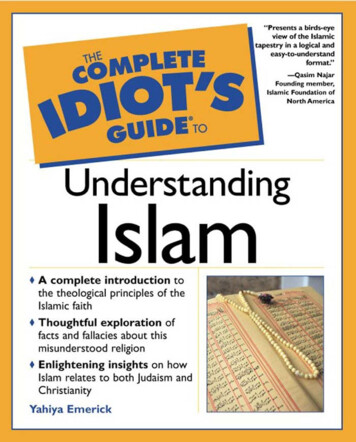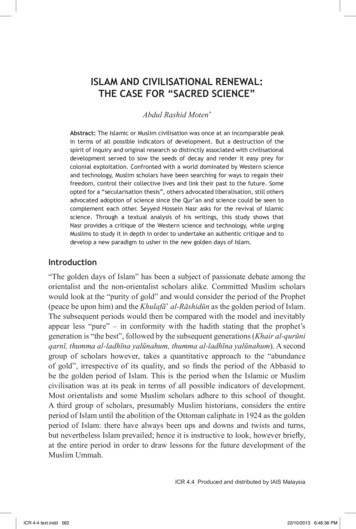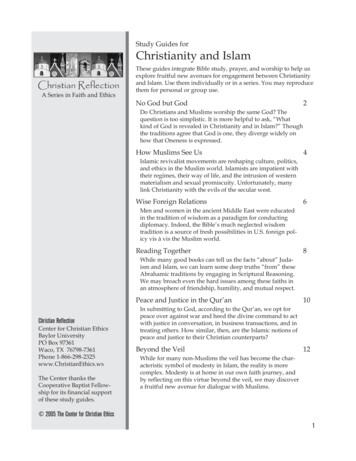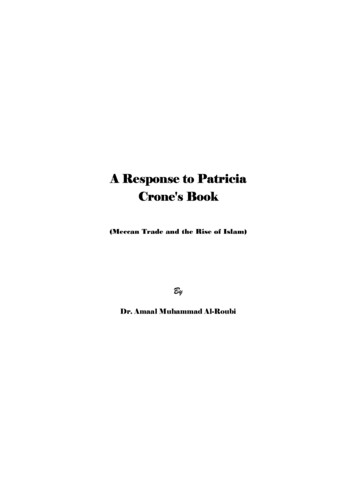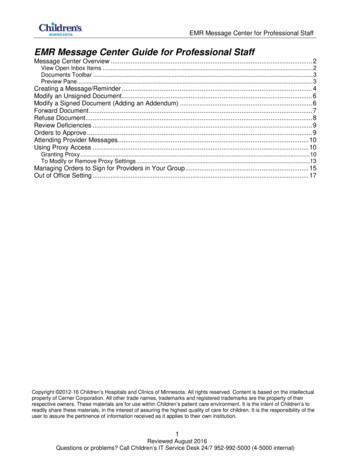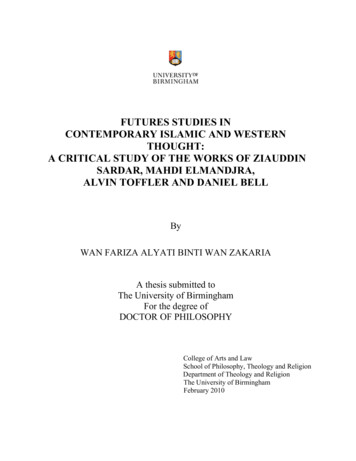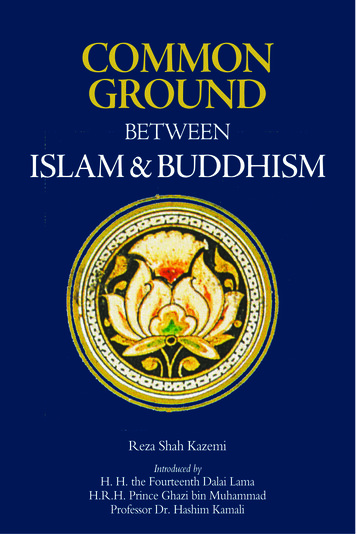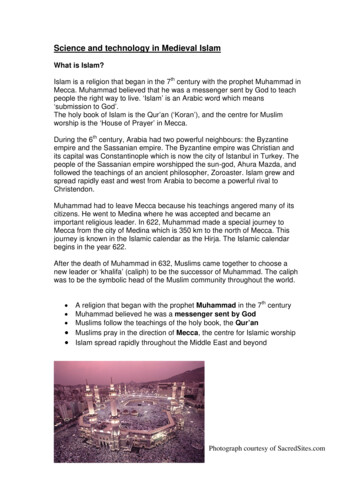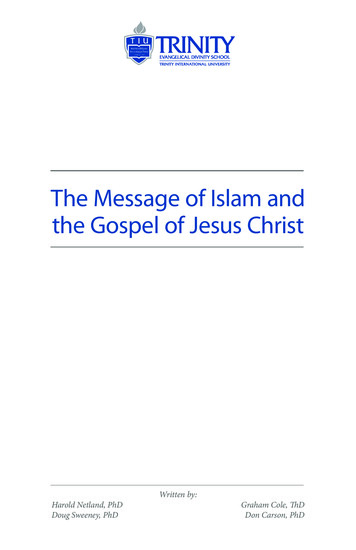
Transcription
The Message of Islam andthe Gospel of Jesus ChristHarold Netland, PhDDoug Sweeney, PhDWritten by:Graham Cole, ThDDon Carson, PhD
TRINITY EVANGELICAL DIVINITY SCHOOLTRINITY EVANGELICAL DIVINITY SCHOOLIslam OverviewQuestions about relations between Muslims and Christians continueto receive widespread attention in the media and society at large. Inparticular, the question, “Do Christians and Muslims worship the sameGod?” has become especially controversial among Christians in the UnitedStates. Responses have often been polarizing, with one side insisting theanswer must be affirmative and the other vehemently denying this. Butthe question itself is highly ambiguous and it conflates different issues inan unhelpful manner. Thus, rather than trying to answer directly whetherChristians and Muslims worship the same God, it is more helpful to considersimilarities and differences in the beliefs of Muslims and Christians, notingboth areas of agreement and disagreement.There are some clear similarities between beliefs of Christians and Muslims.For example, both Islam and Christianity are monotheistic religionsthat maintain that the universe was created by God, that God has givenhumankind a special revelation, and that there will be a final judgment.But there are fundamental differences as well–differences that take us tothe heart of the Christian gospel and the New Testament teachings aboutJesus Christ. What follows is a very concise introduction to some aspectsof Islam and Christianity which focuses upon several significant pointsin which the Christian gospel is different from what Islam traditionallyhas maintained. Highlighting differences in this manner should not betaken as minimizing important similarities between the religions. But thedifferences in belief concern the core of the gospel, so appreciation ofsimilarities must be framed with awareness of basic differences.Islam emerged in the seventh century in what is today Saudi Arabia. The traditionalaccount maintains that God revealed his will to Muhammad (AD 570?-632) in aseries of revelations dictated by the angel Gabriel over roughly twenty years. Theserevelations, codified and put into writing after the death of Muhammad, comprisethe Qur’an, accepted by Muslims as the Word of God. The Qur’an is said to be thedefinitive revelation from God, the culmination of earlier revelations to numerousprophets, including to Jews and Christians (called “People of the Book” in theQur’an). Muhammad is said to be the last and greatest of the prophets.Initially persecuted in Mecca, Muhammad moved to Medina and established there atheocratic society that has served as a model for later Muslim communities. Muslimsquickly conquered surrounding areas, so that within a century of the Prophet’sdeath Muslims could be found not only throughout the Arabian Peninsula but alsoin southern France, Spain, North Africa, central Asia and even in western China.Islam is today a genuinely global religion, with an estimated 1.7 billion Muslimsworldwide compared with roughly 2.4 billion Christians.1 Most Muslims live in Asiaand Africa, with more than 50 per cent of the world’s Muslims living in Indonesia,India, Bangladesh, Pakistan, Nigeria, Iran, Turkey, and Egypt.The major division within Islam is between Shi’ite and Sunni Muslims. Althoughthere are some doctrinal differences between the branches, the division stems fromviolent struggles early on over the legitimate successor to Muhammad. About 85per cent of Muslims today are Sunni and roughly 15 per cent are Shi’ite. Islamtoday faces significant internal tensions as various factions struggle to define whatit means to be Muslim in the twenty-first century. In addition to the tensionsbetween Shi’ites and Sunnis, there are divisions between traditionalists (who resistaccommodations to modernity) and progressives (who maintain that Islam is fullycompatible with modern, democratic societies) as well as between various ethnicgroups. Since the 1980s radical Islamist movements have adopted global terrorismto promote their agendas.Muslims are united in their belief in one God, the Qur’an as God’s revelation, andMuhammad as God’s final prophet. They find unity of practice in the Five Pillars:The shahadah, or declaration of faith (“There is no God but God and Muhammadis the messenger of God”); prayer five times daily; almsgiving; the fast of Ramadan;and, if possible, pilgrimage to Mecca.Islam and the Christian GospelBoth Muslims and Christians affirm that there is one God who is the creator ofeverything that exists (apart from God himself). But although Muslims and Christians1 “Status of Global Christianity, 2015, in the Context of 1900-2050,” International Bulletinof Missionary Research 39:1 (January 2015): 29.
TRINITY EVANGELICAL DIVINITY SCHOOLagree to some extent on some of the divine attributes, they also have fundamentaldisagreements over the nature of God and what God expects from humankind.For example, Muslims regard God as sovereign, merciful, and benevolent, butthey generally do not think of God as loving in the way that the Bible speaks of thelove of God. The Bible declares that “God is love” (1 Jn 4:8, 16), and it is because ofGod’s love for the world that God’s Son was sent to be an atoning sacrifice for oursins (Jn 3:16; 1 Jn 4:10). In turn, Christians are commanded to love God with theirentire being, to love their neighbor (Mt. 22:34-40), and even to love their enemies(Mt. 5:43-47). The Qur’an, by contrast, never identifies God with love, nor doesit command us to love God. Many Muslims would hold that talk of God as lovecompromises his sovereignty, “humanizes” God and distorts what is transcendent.Christians maintain that although God is transcendent and sovereign he is alsopersonal and loving.Both Christians and Muslims believe God has given a special revelation to humankindbut they disagree over the nature of this revelation. Muslims believe that God hasrevealed his will to various prophets in the past, including to the Hebrew prophetsand to Jesus, but that the Old and New Testaments of the Christian Bible have beencorrupted and thus are not authoritative. The Qur’an is the definitive and finalrevelation. Muslims insist that Muhammad was not the author of the Qur’an; he issaid to have been the passive recipient of revelations dictated to him.Christians, by contrast, hold that God has revealed himself progressively in the Oldand New Testaments, comprising the Bible. Christians believe that each book ofthe Bible is simultaneously the product of God and the human author. AlthoughGod superintended the process, so that what was written is what God intends, thedistinctives of the human authors were allowed to shine through. Thus, although theproduct itself is veritably God’s God-breathed word, it is delivered through humanauthors. Christians believe that the Old and New Testaments are the completespecial revelation of God and that no other writings are to be added to the canonof holy scripture. The last of the New Testament writings was completed by the endof the first century, over five centuries before Muhammad is said to have receivedrevelations from God. There is simply no historical or textual evidence to supportthe claim that the Bible accepted by Christians is a corruption of an earlier revelationfrom God that is consistent with the Qur’anic teachings.The New Testament itself points to the incarnation in Jesus Christ as the apex ofGod’s self-revelation (Jn 1:1-18; Heb. 1:1-3). And it is at this point that differencesbetween Islam and the Christian gospel become most pronounced. For Islamtraditionally has denied the doctrine of the incarnation and the holy Trinity. Thisis not a minor disagreement, as the biblical teaching on the deity of Jesus Christ iscentral to the message of the gospel.TRINITY EVANGELICAL DIVINITY SCHOOLIt is true that Jesus is given a prominent place in the Qur’an. He is called the Messiah,Son of Mary, Messenger, Prophet, Servant, Word, and Spirit of God. Jesus is alwaysspoken of in the Qur’an with reverence. The virgin conception of Jesus is indicatedin Surahs 3:45-48 and 19:18-22 of the Qur’an. But the Qur’an omits Jesus’ teachingsand it rejects the suggestion that Jesus is divine. For example, Jesus is portrayedas explicitly denying that he is to be identified with God (5:109-119). Particularlyoffensive to Muslims is the title “Son of God”. There can be little doubt that Muhammadunderstood this title to imply the physical generation of the alleged Son from theFather, an implication he detested (23:90-93; cf. 112). There are also in the Qur’annumerous denunciations of what were taken to be the Christian teaching on theTrinity (cf. 4:171; 9:30-31). The Qur’an seems to assume that Christians believe thatthe Trinity consists of God the Father, the Virgin Mary, and their child—Jesus. This,of course, is not what the Bible teaches nor what the orthodox Christian communityhas affirmed in the doctrine of the Trinity.The death of Jesus Christ on the cross, followed by his glorious resurrection, is atthe heart of the Christian message. The gospel is the good news that Jesus Christ,the incarnate Word and Son of God, is Savior and Lord and that through the life,death and resurrection of Jesus we have forgiveness and redemption from sin, newlife through the indwelling power of the Holy Spirit, and reconciliation with God.There is no gospel without the cross, for it is through Jesus’ atoning death on behalfof sinful human beings that justification and reconciliation with God are possible.But it may come as a surprise to Christians to learn that most Muslims believe thatJesus did not die on the cross. Surah 4:155-159 has been taken by many Muslims asclaiming that although the Jewish leaders tried to kill Jesus they “did not kill him,nor did they crucify him, but they thought they did.”2 For Muslims it is unthinkablethat God would allow Jesus, God’s anointed prophet, to be crucified. As KennethCragg observes, “The event which is the very fount and heart of Christianity isheld by Muslims to be unhistorical and incredible.”3 There is in Islam no need forsomething like Christ’s atoning death, for each person is responsible for his or herown actions (36:54; 53:38; 82:19). Sin, within Islam, is not a matter of the totaldepravity of human nature but more a weakness, defect, or flaw in human character(cf. 4:28; 30:54; 7:19-25).Disciples of Jesus Christ In A Religiously Diverse WorldChristians in the West are part of a world that is becoming more tightly interconnectedon many levels. American society is itself becoming increasingly diverse. Divisionsand tensions over ethnic, cultural, ethical and religious matters often drive furtherpolarization among various groups. How should Christians respond to Muslimsand adherents of other religions in American society? The importance of affirming2 The Koran, Trans. N. J. Dawood (Hammondsworth: Penguin, 1974) p. 382.3 Kenneth Cragg, Jesus And The Muslim (Oxford: Oneworld, 1999) p. 166.
TRINITY EVANGELICAL DIVINITY SCHOOLboth similarities and differences in beliefs and practices between Muslims andChristians has already been noted. The differences are real and are significant.Nevertheless, even as differences are acknowledged Christians should also recognizethe importance of cultivating healthy relationships with Muslims and seekingtogether the common good.Further readingFirst, as disciples of Jesus Christ, Christians are to be good citizens (Mt. 22:15-22;Rom. 13:1-7; 1 Pet. 2:13-17). There are roughly 3.3 million Muslims in the UnitedStates (compared with 5.7 million Jews and 2.1 million Hindus)4 and Muslimsserve in the U.S. military, in local, state, and federal government positions, and areactive throughout the business, medical and educational communities. AmericanMuslims, like all citizens, are guaranteed freedom of religious belief and practiceby the U.S. Constitution. American Christians should welcome American Muslimsas fellow citizens and should work to establish relationships with Muslims at work,at school and in the community. Where Muslims and Christians share commoninterests they should work together for the common good.George, Timothy. Is the Father of Jesus the God of Muhammad? (Grand Rapids:Zondervan, 2002).Moreover, Jesus’ disciples are to love their neighbors (Mt. 22:34-40), and in Americansociety today this includes Muslims. Loving others includes seeking the well-beingof the other and acting in ways that promote the good of the other. Christians areto treat others, including Muslims, the way that they would wish to be treated byothers (Mt. 7:12).Finally, Christians are to make disciples of all peoples (Mt. 28:18-20), and thisincludes Muslims. In faithfulness to the Lord Jesus, Christians must share the gospelwith their Muslim neighbors, clarifying misconceptions they might have of thegospel and urging them to accept Jesus, the Son of God, as Lord and Savior. Givencenturies of mutual suspicion and misunderstandings and the current tensions, doingso in a winsome and responsible manner will not be easy. But this is the challengefacing American Christians in the days ahead: to be appropriately accepting andwelcoming of Muslims as neighbors while also encouraging them to become disciplesof Jesus Christ. The Christian obligation and privilege to love one’s neighbor doesnot depend on Christians agreeing with Hindus or Muslims about their respectiveunderstandings of God, or even with Buddhists or atheists who deny God’s reality.Differences of understanding are real and profound. But the obligation to love one’sneighbor springs from the fact that all human beings are made in the image of God,and from the command and example of the Lord Jesus himself.4 Besheer Mohamed, “A New Estimate of the U.S. Muslim Population”, PewResearchCenter,January 6, 2016, new-estimate-of-theu-s-muslim-population/.Brown, Daniel W. A New Introduction to Islam, 2nd ed. (Oxford:Wiley-Blackwell, 2009).Cragg, Kenneth. Jesus and the Muslim: An Exploration (Oxford: Oneworld,1999 [1985]).Nickel, Gordon. The Gentle Answer to the Muslim Accusation of BiblicalFalsification (Calgary: Burton Gate, 2015).Shenk, David W. Christian. Muslim. Friend. Twelve Paths to Real Relationship(Harrisonburg, VA: Herald Press, 2014).
e death of Jesus Christ on the cross, followed by his glorious resurrection, is at the heart of the Christian message. e gospel is the good news that Jesus Christ, the incarnate Word and Son of God, is Savior and Lord and that through the life, death and resurrection of Jesus
